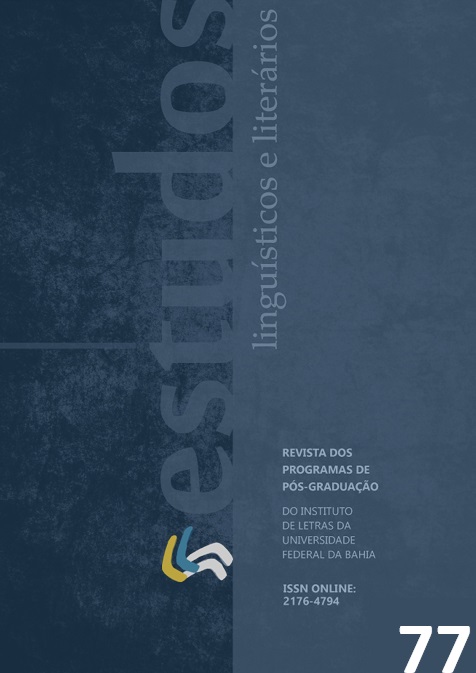MAIS SOBRE A NEGAÇÃO EM PORTUGUÊS BRASILEIRO
DOI:
https://doi.org/10.9771/ell.v0i77.61685Keywords:
Negação; Perífrases progressivas e perfectivas; Sintaxe; Português brasileiroAbstract
Há um uso inovador para a negação no português brasileiro (doravante, PB), em que o marcador negativo não (doravante, não baixo) é possível na posição entre o auxiliar e o verbo não-flexionado em perífrases progressivas e perfectivas. Uma vez que a negação não pode aparecer nessa posição em outras línguas românicas, eu discuto uma possível análise para essa nova construção. Primeiramente, eu discuto as propriedades de “eventualidades inibidas” possíveis em espanhol (Fábregas; González-Rodríguez, 2019, 2020, 2021), para checar suas semelhanças e diferenças com o ‘não baixo’ do PB. Em seguida, eu considero a posição sintática para o ‘não baixo’, dadas suas propriedades e a literatura sobre posições múltiplas para a negação (Declercq, 2013). Depois, assumindo a proposta de Ramchand (2018), eu proponho que, diferentemente do inglês, os verbos auxiliares de ambas as perífrases são gerados dentro do vP em PB. Além disso, assumo que o ‘não baixo’ se tornou possível no PB porque houve a perda de movimento do verbo para uma posição funcional alta na língua. Assim, o verbo lexical sobe apenas para uma posição mais baixa (aspectual), ao passo que o auxiliar se move para uma posição mais alta (Cyrino, 2013; Cyrino; Araújo-Adriano, 2023).
Downloads
References
ARAÚJO-ADRIANO, P. Â. The present tense analyticisation process in Brazilian Portuguese: a diachronic approach. 2023. Tese (Doutorado em Linguística) – Universidade Estadual de Campinas, Campinas.
ARKADIEV, P. 2015. Negative events: Evidence from Lithuanian. In: ARKADIEV, P.; KAPITONOV, I.; LANDER, Y.; RAKHILINA, E.; TATEVOSOV, S. (eds.). Donum semanticum: Opera linguistica et logica in honorem Barbarae Partee a discipulis amicisque Rossicis oblate. Moscow: LRC Publishing, 2015. p.7–20.
BELLETTI, A. Aspects of the low IP area. In: Rizzi, L. (ed.) The structure of IP and CP: the cartography of syntactic structures. Oxford: Oxford University Press, 2004, p. 16–51.
CAVALCANTE, R. Negação anafórica no português brasileiro: negação sentencial, negação enfática e negação de constituinte. 2012. Tese (Doutorado em Linguística) – Universidade de São Paulo, São Paulo.
_____. A negação pós-verbal no português brasileiro: análise descritiva e teórica de dialetos rurais de afro-descendentes. 2007. Dissertação (Mestrado em Letras e Linguística) – Universidade Federal da Bahia, Salvador.
CYRINO, S. More on negation in Brazilian Portuguese. Paper presented at the IV Encontro de Gramática Gerativa, Universidade Federal da Bahia, March 28-30. 2023.
_____. More on negation in Brazilian Portuguese. Paper presented at the History of Negation Seminar, University of Yale- University of Bologna. October 27, 2022. 2022a.
_____. More on negation in Brazilian Portuguese. Paper presented at the Romance Linguistics at Cambridge (RoLinC) Seminar. University of Cambridge & University of Newcastle, November 1, 2022. 2022b.
_____. On richness of tense and verb movement in Brazilian Portuguese. In: CAMACHO-TABOADA, V.; JIMÉNEZ-FERNÁNDEZ, Á.; MARTÍN-GONZÁLEZ, J.; REYES-TEJEDOR, M. (eds.). Information Structure and Agreement. Amsterdam: John Benjamins Publishing, 2013. p. 297–317.
_____. On complex predicates in Brazilian Portuguese. Ibéria- International Journal of Theoretical Linguistics. v. 2, n. 2, 2010. http://www.siff.us.es/iberia/index.php/ij/index
_____. A sintaxe da negação o português brasileiro: novas perperspectivas de análise e subsídios para o estudo da história da negação. Projeto Produtividade em Pesquisa, CNPq 303015/2022-5, in progress.
CYRINO; ARAÚJO-ADRIANO, P. Â. On the loss of verb movement in BP and the emergence of structural gaps in auxiliary + verb constructions. Trabalho apresentado no IV Generative Grammar Meeting. Universidade Federal da Bahia, 2023.
CYRINO; BIBERAUER, T. Appearances are Deceptive: Jespersen’s Cycle from the Perspective of the Romania Nova and Romance-based Creoles. Paper presented at Going Romance 23. University of Nice, Nice. 2009.
CYRINO; MATOS G. Local licensers and recovering in VP ellipsis. Journal of Portuguese Linguistics n. 4. p. 79–112, 2005.
DECLERCQ, K. A unified syntax of negation. PhD Dissertation, University of Gent, 2013.
DE PAULA, D.C.F. O sintagma verbal em português: construções perifrásticas e não-perifrásticas. 2014. Dissertação (Mestrado em Linguística) – Universidade Estadual Paulista, São José do Rio Preto.
FÁBREGAS, A.; GONZÁLEZ-RODRÍGUEZ, R. Negation with Participles and Inhibited Events. Linguistic Analysis, v. 43, p. 1–2, 2021.
_____. On inhibited eventualities. Natural Language and Linguistic Theory, v. 38, p. 729–773, 2020.
_____. Perífrasis e inductores negativos: un análisis en términos de domínios. Onomázedin, v. 43, p. 95–11, 2019.
GIORGI, A.; PIANESI, F. Tense and Aspect. Oxford: Oxford University Press, 1997.
JARRAH, M.; ABUSALIM, N. In favor of the low IP area in the Arabic clause structure. Natural Language and Linguistic Theory, v. 39, p.123–156, 2021.
MENDES, R. Estar + gerúndio e ter + particípio: aspecto verbal e variação no português. 2005. Tese (Doutorado em Linguística) – Universidade Estadual de Campinas, Campinas.
OUWAYDA, S.; SHLONSKY, U. The wandering subjects of the Levant: “Verbal Complexes” in Lebanese Arabic as phrasal movement. Brill’s annual of Afroasiatic languages and linguistics v. 8, p. 136–153, 2016.
POLETTO, C. On negative doubling. Quaderni di lavoro ASIT v. 8 p. 57–84, 2008.
RAMCHAND, G. Situations and syntactic structures. Cambridge: The MIT Press, 2018.
_____. First phase syntax. Cambridge: Cambridge University Press, 2008.
RAMCHAND, G.; SVENONIUS, P. Deriving the functional hierarchy. Language Sciences v. 46, p. 152–174, 2014.
SCHWENTER, S. 2005. The pragmatics of negation in Brazilian Portuguese. Lingua, v. 115, n. 10, p. 1427–1456, 2005.
TEIXEIRA DE SOUSA, L. Three types of negation in Brazilian Portuguese. Lingua, v. 159, p. 27–46, 2015.
TRAVIS, L. Parameters and effects of word order variation. 1984. Doctoral dissertation – Massachusetts Institute of Technology, Massachusetts.
VENDLER, Zeno. Linguistics in philosophy. Ithaca: Cornell University Press, 1967.
ZANUTTINI, R. Negation and clausal structure: a comparative study of Romance languages. Oxford: Oxford University Press, 1997.
_____. On the relevance of tense for sentential negation. In BELLETTI, A.; RIZZI, L. (eds.). Parameters and Functional Heads: Essays in Comparative Syntax. Oxford: Oxford University Press, 1996. p. 181–207.


